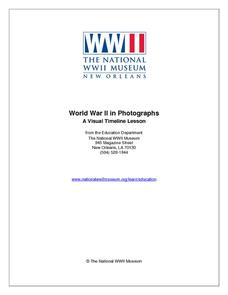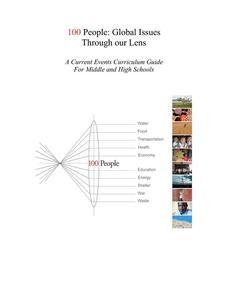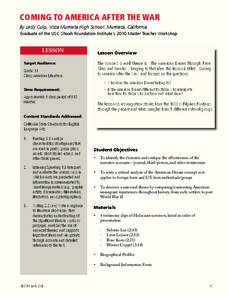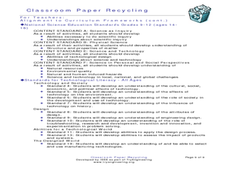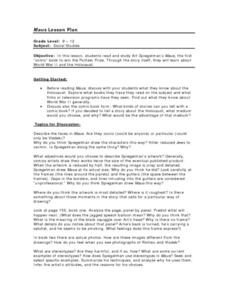US Holocaust Museum
Deconstrucing the Familiar
Collaboration and complicity. Class members examine a series of photographs and consider how active participation and passive complicity represented in the photos contributed to the Holocaust.
Royal Canadian Legion
Teachers' Guide: Take Time to Remember
The Royal Canadian Legion offers this teacher's guide designed to remind learners of all ages of the sacrifices made by Canadian soldiers in not only World War I but also the Korean and Gulf wars. The 42-page packet is filled with...
National WWII Museum
World War II in Photographs
A picture is worth a thousand words, and this activity is worth so much more! Learners closely analyze a series of photographs from World War II, matching them with their appropriate captions and sequencing them into a correct timeline.
Amnesty International
Hotel Rwanda Teacher's Guide
Here is the comprehensive, official educator's guide for presenting Hotel Rwanda and the story of the Rwandan genocide in 1994 to a classroom environment. It includes a range of exceptional hands-on or discussion activities, as well as a...
Foreign Policy Association
U.S. and Europe Online Lesson Plan
Class groups investigate the economic and political implications of a country's policies on genetically modified foods, craft a position paper detailing that policy, and share their findings with the class. Armed with this information,...
100 People Foundation
100 People: Global Issues Through Our Lens
If the world were 100 people...17 would not have access to safe drinking water, 18 would not be able to read or write, and 52 would not have a primary education. Using the theme of "100 people," this resource explores other major issues...
Advocates for Human Rights
The Right to Workers in United States
To raise awareness and understanding of modern-day slavery, class groups research the various forms of slavery, including human trafficking, read and reflect on case studies, and design a plan of action for their community.
University of Southern California
Coming to America After the War
As part of their exploration of the American dream, class members examine primary source materials to compare immigrant experiences of those arriving early in our country's history to those arriving in the US after World War II. To...
University of Southern California
Persecution of the German-Jews: The Early Years - 1933-1939
Young historians learn about the dehumanization process of stripping German Jews of basic, fundamental rights prior to the genocide of European Jews in the 1940s. Learners watch video clips of survivors who recount such events as the...
TED-Ed
The Colossal Consequences of Supervolcanoes
The threat posed by super volcanoes is explored in a short video that reviews the destruction caused by Mount Tambora in 1815 and by Peru's Huaynaputina in 1600. Think it can't happen again? The narrator contends that the explosive...
TED-Ed
Tycho Brahe, the Scandalous Astronomer
Who says scientists are boring geeks? Certainly not the narrator of a short video who dishes up the scandals associated with Tycho Brahe, a Danish scientist and alchemist (now that's two labels you don't often see together) who used...
University of Arkansas
Assessment and Discussion
"Without concerned citizen action to uphold them (human rights) close to home; we shall look in vain for progress in the larger world. . ." Eleanor Roosevelt's comment is used to set the stage for the conclusion of a five-lesson unit...
University of Arkansas
Individuals Making a Difference
The focus of this, the third in a five-activity unit study of human rights, is on individuals who made a difference. Billy Bowlegs, Dr. Sun Yat Sen, Fannie Lou Hamer, Michi Weglyn, and Yuri Koshiyama are some of the people class members...
AGSSS
World Regions
Help your learners to visualize where historical events have taken place around the globe with a map that details the major regions of the seven continents.
National Endowment for the Humanities
A “New English” in Chinua Achebe’s “Things Fall Apart”: A Common Core Exemplar
To examine the “New English” Chinua Achebe uses in Things Fall Apart, readers complete a series of worksheets that ask them to examine similes, proverbs, and African folktales contained in the novel. Individuals explain the meaning...
National Endowment for the Humanities
Courage “In the Time of the Butterflies”: A Common Core Exemplar
The courage of Las Mariposas, the Mirabal sisters, is the focus of a series of activities designed to accompany a reading of In the Time of the Butterflies that ask readers to consider what it means to be courageous. Beautifully crafted...
Clark County School District
Hollywood's Take on the Cuban Missile Crisis: Thirteen Days
Watching the film Thirteen Days is an engaging way of acquainting learners with the Cuban missile crisis, and this activity is the perfect accompaniment for viewership! It includes 15 questions for your young historians to consider and...
University of California
Roots of the Cold War
When and how did the Cold War begin? To answer this question, you will not find a better-organized, in-depth, activity- and inquiry-based resource than this! Executing best teaching practices throughout, each portion of this inquiry...
Institute of Electrical and Electronics Engineers
Classroom Paper Recycling
After reading about the history and recycling of paper, creative crafters collaborate to think of a new process for making recycled paper. A complete teacher's guide and student worksheets are included. There is no written procedure for...
PBS
Historical Perspectives: Coming Home from War
What do the homecoming experiences of soldiers who fought in WWII, Vietnam, Iraq, and Afghanistan reveal about the politics and culture of the US during the time period of each war? Young historians view The Way We Get By, which tells...
Denver Art Museum
Lesson: Facebook for a Prince
In 1538 a portrait and a praise poem were created in honor of Edward, Prince of Wales. Your class will analyze the poem and painting, research the life of young Edward, then use the information to create a Facebook page. They will...
Curated OER
Maus Lesson Plan
The artistic choices Art Spiegelman made in his graphic novel, Maus, are the focus of an exercise that asks class members to compare classic comic book forms with Spiegelman’s panels and frames. Directed to specific pages and guided by a...
John F. Kennedy Presidential Library & Museum
Analyzing the Rhetoric of JFK’s Inaugural Address
“And so, my fellow Americans: ask not what your country can do for you—ask what you can do for your. country.” Did you know that John Kenneth Galbraith, Adlai Stevenson, and Theodore Sorensen helped John F. Kennedy craft his 1961...
Robert F. Kennedy Center for Justice and Human Rights
Vaclav Havel: Free Expression
Develop an understanding of universal human rights, particularly the freedom of expression, with the questions and activities that analyze the conflicts of Vaclav Havel. Learners define, interpret and rephrase the human rights article in...




